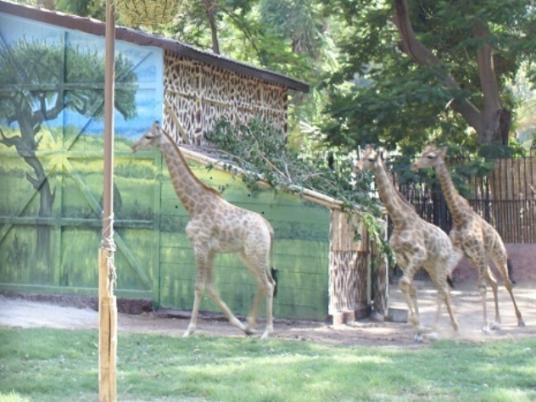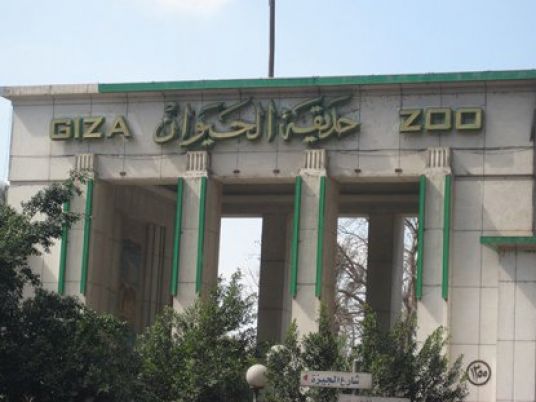The first days of Eid saw the Giza zoo transformed into a battlefield. Children practically executed a coup, ignoring any authority as they ran around freely, playing football on the paths that wind through the zoo and occasionally fetching a lost ball from the animal cages. They only paused to shoot at animals with pellet guns and throw empty cans into the cages.
Around 73,000 people visited the zoo on the first day of Eid, making it virtually impossible for the understaffed cage keepers to protect the animals as swarms of children attempted to force their way into the cages. Mohammed, the cage keeper who supervises the ostrich area, complains, “We only have 89 cage keepers in the zoo. The areas under our supervision are far too large for proper surveillance of both the animal and the visitors.”
He confesses that he was unable to prevent the abuse that took place during the frenzied days of Eid el-Fitr. “If a kid jumped into this cage, behind the kiosk,” says Mohammed, pointing at and walkways over 100 meters away, “I would not see him from where I stand now.” His shoulders sag with discouragement.
Like most of his colleagues, Mohammed received an extra LE 75 for the four days of Eid—a significant bonus to the LE 300 he earns a month.
Souliman, another zoo employee, stands a few meters away, wearing a badly-cut, dark-green uniform that he keeps as clean as possible in order to maximize baksheesh, or tips. He comes closer and says, “I have been working here for 8 years. I take care of the animals, I feed them, I clean their cages and I am paid LE 100 a month.”
Souliman says his salary has never increased since he took the job, which contradicts the information delivered by Nabil Sedqy, the director of the zoo, who maintains that there is a “15 per cent pay rise each year for every employee of the zoo.”
To make ends meet the guards resort to taking baksheesh. Sedqy raises an ironic eyebrow when he is asked to clarify his position on this “illegal” source of income “This country’s culture is soaked in baksheesh; I don’t see why the zoo should be an exception,” he says with an ironic smile.
Said, a cage-keeper with a thick moustache and a pale green cap, says, “I get an extra LE 5 or LE 10 a day from baksheesh.” In spite of his 24 years of service, he earns a mere LE 380 a month, making it impossible to give his family a decent life.
“You cannot get a flat for less than LE 300, right? That leaves only LE 80 for cigarettes, food, education,” he says. “My son studies at Cairo University and I want my daughter to get married, and so how am I supposed to help her with this kind of salary?” The camel standing behind him suddenly grumbles, before lazily chewing a piece of dry fruit that dangles at the tip of the cage-keeper’s stick.
Mohammed, the supervisor of the ostriches lives in Qanater, about 16 kilometres north of Cairo, and spends LE 10 commuting to and from the zoo. “I try to cut some of the expenses by having lunch and dinner at the zoo, and some of my colleagues stay over at night, because they cannot afford to pay for transportation every single day,” he says.
A gardener approaches, his brown uniform covered with dirt and grass. Shyly, he confesses that he makes LE 90 a month or LE 3 a day. He looks down dusty alley where he stands and then looks up, his eyes darkening with resentment. “The low salary is not the only concern of the employees of the zoo. The visitors see us as beggars or slaves and treat us accordingly,” he says, visibly depressed.
The visitors also complicate the task of the cage keepers by feeding the animals cookies, cakes and other unsuitable foods. It is not uncommon for visitors to throw their chip bags and soda cans into the animals’ cages, ignoring the garbage bins that line the paths.
Abu, another zoo employee, is outraged at how quickly patrons can sully the zoo premises. “The zoo has been open for only an hour. Look at all the trash we’ve collected already,” he says, pointing at the evidence of his morning’s labour.
Behind him, five dumpsters filled to the rim with colourful garbage await the garbage truck.


